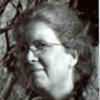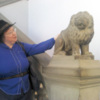Connie Willis
Author of Doomsday Book
About the Author
Connie Willis lives in Greeley, Colorado, with her family. (Publisher Provided) Connie Willis was born on December 31, 1945. She graduated from Colorado State College in 1967. Her first story, The Secret of Santa Titicaca, was published in Worlds of Fantasy in 1971. After receiving an NEA grant in show more 1982, she left her teaching job to become a full-time writer. Her works include Doomsday Book, Lincoln's Dreams, Bellwether, To Say Nothing of the Dog, Fire Watch, Blackout, and All Clear. She has received 10 Hugo Awards, 11 Locus Poll Awards and 6 Nebula Awards. In 2009, she was inducted into the Science Fiction Hall of Fame. (Bowker Author Biography) show less
Image credit: Credit: Ellen Levy Finch, 1998, Seattle, Washington
Series
Works by Connie Willis
A Woman's Liberation: A Choice of Futures by and About Women (2001) — Editor; Contributor — 130 copies
Nonstop to Portales [novelette] 7 copies
2000x: Even the Queen (Unabridged) 3 copies
Dilemma 3 copies
Cash Crop [short story] 3 copies
The Curse of Kings 2 copies
Selección de relatos 1 copy
Nightkill 1 copy
With Friends Like These 1 copy
Blitz, T2 : All Clear 1 copy
Associated Works
Alien Sex: 19 Tales by the Masters of Science Fiction and Dark Fantasy (1990) — Contributor — 499 copies, 6 reviews
The Big Book of Science Fiction: The Ultimate Collection (2016) — Contributor — 473 copies, 7 reviews
The Year's Best Science Fiction: Tenth Annual Collection (1993) — Contributor — 449 copies, 5 reviews
The Year's Best Science Fiction: Eleventh Annual Collection (1994) — Contributor — 447 copies, 2 reviews
The Year's Best Science Fiction: Ninth Annual Collection (1992) — Contributor — 433 copies, 4 reviews
The Best of the Best: 20 Years of the Year's Best Science Fiction (2005) — Contributor — 410 copies, 20 reviews
The Year's Best Science Fiction: Eighth Annual Collection (1991) — Contributor — 392 copies, 6 reviews
The Norton Book of Science Fiction: North American Science Fiction, 1960-1990 (1993) — Contributor — 330 copies, 6 reviews
The Year's Best Science Fiction: Seventh Annual Collection (1990) — Contributor — 294 copies, 2 reviews
The Locus Awards: Thirty Years of the Best in Science Fiction and Fantasy (2004) — Contributor — 276 copies, 10 reviews
The New Hugo Winners: Award Winning Science Fiction Stories (1989) — Contributor — 223 copies, 4 reviews
Women of Wonder, the Contemporary Years: Science Fiction by Women from the 1970s to the 1990s (1995) — Contributor — 211 copies, 2 reviews
The Year's Best Science Fiction: Fourth Annual Collection (1987) — Contributor — 210 copies, 1 review
The Best Science Fiction and Fantasy of the Year Volume One (2007) — Contributor — 205 copies, 6 reviews
2041: Twelve Short Stories About the Future by Top Science Fiction Writers (1991) — Contributor — 172 copies, 4 reviews
The Year's Best Science Fiction: First Annual Collection (1984) — Contributor — 140 copies, 1 review
Gateways: A Feast of Great New Science Fiction Honoring Grand Master Frederik Pohl (2010) — Contributor — 103 copies, 2 reviews
Asimov's Science Fiction: Hugo & Nebula Award Winning Stories (1995) — Contributor — 97 copies, 2 reviews
The Future Is Female! Volume Two, The 1970s: More Classic Science Fiction Storie s By Women: A Library of America… (2022) — Contributor — 90 copies, 3 reviews
Time Machines: The Greatest Time Travel Stories Ever Written (1998) — Contributor — 81 copies, 5 reviews
Why I Left Harry's All-Night Hamburgers and Other Stories from Isaac Asimov's Science Fiction Magazine (1992) — Contributor — 67 copies
Nebula Awards 28: SFWA's Choices for the Best Science Fiction and Fantasy of the Year (1994) — Contributor — 66 copies
Nebula Awards 24: SFWA's Choices for the Best Science Fiction and Fantasy 1988 (1990) — Contributor — 61 copies
Asimov's Science Fiction Magazine: 30th Anniversary Anthology (2007) — Contributor — 58 copies, 1 review
Nebula Awards 29: SFWA's Choices For The Best Science Fiction And Fantasy Of The Year (Nebula Awards Showcase) (1995) — Contributor — 57 copies
This Way to the End Times: Classic Tales of the Apocalypse (2016) — Contributor — 47 copies, 2 reviews
Tales from Isaac Asimov's Science Fiction Magazine: Short Stories for Young Adults (1986) — Contributor — 41 copies
Asimov's Science Fiction: Vol. 41, No. 11 & 12 [November/December 2017] (2017) — Contributor — 22 copies, 3 reviews
The War of the Worlds: Fresh Perspectives on the H. G. Wells Classic (2005) — Contributor — 19 copies
Isaac Asimov's Science Fiction Magazine: Vol. 12, No. 7 [July 1988] (1988) — Contributor — 19 copies, 1 review
Isaac Asimov's Science Fiction Magazine: Vol. 8, No. 1 [January 1984] (1984) — Contributor — 19 copies
Isaac Asimov's Science Fiction Magazine: Vol. 10, No. 10 [October 1986] (1986) — Contributor — 15 copies
Asimov's Science Fiction: Vol. 31, No. 12 [December 2007] (2007) — Contributor — 15 copies, 1 review
Asimov's Science Fiction: Vol. 23, No. 10 & 11 [October/November 1999] (1999) — Contributor — 14 copies
The Magazine of Fantasy and Science Fiction August 1982, Vol. 63, No. 2 (1982) — Contributor — 14 copies
Isaac Asimov's Science Fiction Magazine: Vol. 10, No. 12 [December 1986] (1986) — Contributor — 14 copies
Isaac Asimov's Science Fiction Magazine: Vol. 9, No. 1 [January 1985] (1985) — Contributor — 14 copies
Isaac Asimov's Science Fiction Magazine: Vol. 12, No. 1 [January 1988] (1988) — Contributor — 13 copies
Isaac Asimov's Science Fiction Magazine: Vol. 15, No. 15 [Mid-December 1991] (1991) — Contributor — 12 copies
Isaac Asimov's Science Fiction Magazine: Vol. 14, No. 13 [December 1990] (1990) — Contributor — 12 copies
Isaac Asimov's Science Fiction Magazine: Vol. 16, No. 4 & 5 [April 1992] (1992) — Contributor — 12 copies
The Magazine of Fantasy and Science Fiction November 1982, Vol. 63, No. 5 (1982) — Contributor — 12 copies
The Magazine of Fantasy and Science Fiction February 1985, Vol. 68, No. 2 (1985) — Contributor — 12 copies
Isaac Asimov's Science Fiction Magazine: Vol. 7, No. 4 [April 1983] (1983) — Contributor — 12 copies
Isaac Asimov's Science Fiction Magazine: Vol. 11, No. 12 [December 1987] (1987) — Contributor — 11 copies
Isaac Asimov's Science Fiction Magazine: Vol. 15, No. 14 [December 1991] (1991) — Contributor — 11 copies
Isaac Asimov's Science Fiction Magazine: Vol. 9, No. 3 [March 1985] (1985) — Contributor — 11 copies
Asimov's Science Fiction: Vol. 21, No. 12 [December 1997] (1997) — Contributor — 11 copies, 1 review
Isaac Asimov's Science Fiction Magazine: Vol. 13, No. 7 [July 1989] (1989) — Contributor — 10 copies
Isaac Asimov's Science Fiction Magazine: Vol. 6, No. 2 [February 1982] (1982) — Contributor — 10 copies
Isaac Asimov's Science Fiction Magazine: Vol. 13, No. 13 [Mid-December 1989] (1989) — Contributor — 9 copies
Isaac Asimov's Science Fiction Magazine: Vol. 15, No. 11 [October 1991] (1991) — Contributor — 8 copies
High Fantastic: Colorado's Fantasy, Dark Fantasy and Science Fiction (1995) — Contributor — 7 copies
The Magazine of Fantasy and Science Fiction 68. Mythen der nahen Zukunft. (1984) — Contributor — 7 copies
Heyne Science Fiction Jahresband 1991. 8 Romane und Erzählungen prominenter SF- Autoren. (1993) — Contributor — 6 copies
Johann Sebastian Bach Memorial Barbecue. Internationale Science Fiction Erzählungen. (1992) — Contributor — 4 copies
I Premi Hugo 1976-1983 — Contributor — 3 copies
Asimov's Science Fiction: Vol. 44, No. 11 & 12 [November/December 2020] (2020) — Contributor — 3 copies
Millemondi Inverno 1996 — Contributor — 2 copies
Omni Magazine October 1989 — Contributor — 2 copies
The World Fantasy Convention 2011: Sailing the Seas of the Imagination — Contributor — 1 copy
Urania Millemondinverno 1991 — Contributor — 1 copy
Science Fiction Eye #07, August 1990 — Contributor — 1 copy
Tagged
Common Knowledge
- Canonical name
- Willis, Connie
- Legal name
- Willis, Constance Elaine Trimmer
- Birthdate
- 1945-12-31
- Gender
- female
- Nationality
- USA
- Country (for map)
- USA
- Birthplace
- Denver, Colorado, USA
- Places of residence
- Greeley, Colorado, USA
Denver, Colorado, USA (birthplace) - Education
- Colorado State College (BA, English and Elementary Education, 1967)
- Occupations
- science fiction writer
historical novelist - Organizations
- Science Fiction and Fantasy Writers of America (SFWA)
- Awards and honors
- Science Fiction Chronicle Reader Award ( [1982] ∙ 1989 ∙ 1993 ∙ [1994])
Guest of Honour, Eastercon, UK (1998)
Guest of Honor, World Science Fiction Convention ( [2006])
Jack Williamson Lectureship (1994, 1999, 2003, 2007)
SF Hall Of Fame (2009)
Damon Knight Memorial Grand Master Award (2012) - Agent
- The Lotts Agency
Members
Discussions
Group read: Connie Willis month in 2014 Category Challenge (January 2015)
To say nothing of the dog: Connie Wills - reading_fox's review in Reviews reviewed (January 2010)
Time travel through net to 11th century. Oxford. Flu virus. in Name that Book (July 2009)
Reviews
Book club pick ☺
I have always been fond of Three Men in a Boat. It is incredibly nice to come back to To Say Nothing of the Dog, which is basically a love letter to Jerome K. Jerome, an idealised image of Victorian England, Victorian fiction, and Golden Age mystery novels. The author turns all of the above on its head and creates a delightful time travel romp. The stakes are high, too – it’s the whole space-time continuum, no less ;)
There is something to chuckle, laugh, or smile at on show more every page.
“ ’What on earth were you doing in the water?’
‘Drowning’, said professor Peddick.”
I loved the effects of time-lag (it happens when you do too much time travelling), which include attacks of maudlin sentimentality. Then you say stuff like “It’s no wonder they call you man’s best friend. Faithful and loyal and true, you share in our sorrows and rejoice in our triumphs…” ets etc. Lovely.
There are lots of misunderstandings and people talking at each other rather than to each other, because their brains went on a holiday. Really, I wouldn’t trust any of these characters with ordering a coffee for me, let alone time travel. But it also means that you are wonderfully entertained all the way through.
Things come together very satisfyingly by the end. Don’t look too closely, though, because time travel books rarely make sense. Just go with the flow, dear reader. Enjoy the flow of the Thames... :))) show less
I have always been fond of Three Men in a Boat. It is incredibly nice to come back to To Say Nothing of the Dog, which is basically a love letter to Jerome K. Jerome, an idealised image of Victorian England, Victorian fiction, and Golden Age mystery novels. The author turns all of the above on its head and creates a delightful time travel romp. The stakes are high, too – it’s the whole space-time continuum, no less ;)
There is something to chuckle, laugh, or smile at on show more every page.
“ ’What on earth were you doing in the water?’
‘Drowning’, said professor Peddick.”
I loved the effects of time-lag (it happens when you do too much time travelling), which include attacks of maudlin sentimentality. Then you say stuff like “It’s no wonder they call you man’s best friend. Faithful and loyal and true, you share in our sorrows and rejoice in our triumphs…” ets etc. Lovely.
There are lots of misunderstandings and people talking at each other rather than to each other, because their brains went on a holiday. Really, I wouldn’t trust any of these characters with ordering a coffee for me, let alone time travel. But it also means that you are wonderfully entertained all the way through.
Things come together very satisfyingly by the end. Don’t look too closely, though, because time travel books rarely make sense. Just go with the flow, dear reader. Enjoy the flow of the Thames... :))) show less
A Lot Like Christmas is an updated and expanded version of Connie Willis's Miracle, a collection of her Christmas-themed fantasy and SF stories. None of the stories are original to this collection, though five of them are new additions since the 2000 publication of Miracle.
The stories are all delightful, but you do notice some similarities when you read them all in one batch. Willis is fond in her holiday stories of throwing together a pair of co-workers or acquaintances who realize, after show more a lot of zippy screwball-esque banter, that they are meant to be together. (The words, "Why, Miss Jones, you're beautiful!" don't actually appear anywhere, but they might as well.)
Nearly half of these stories are of that type, but the story details are different enough to keep you going despite the repetition. "Newsletter" mixes Christmas with Invasion of the Body Snatchers; "deck.halls@boughs/holly" imagines the future of party planning; "Now Showing" turns a trip to the multiplex into a spy caper. Best of this bunch, and for me the best story in the book, is "All Seated on the Ground," a story about choral singing and xenolinguistics.
Willis's stories borrow elements from Sherlock Holmes ("Cat's Paw"), The Twilight Zone ("In Coppelius's Toyshop"), and All About Eve ("All About Emily"). We're warned that a white Christmas isn't always all it's cracked up to be ("Just Like the Ones We Used To Know") and paid a visit from a very un-Dickensian Spirit of Christmas Present ("Miracle").
These are lovely bagatelles, and only the Grinchiest reader could fail to be amused. show less
The stories are all delightful, but you do notice some similarities when you read them all in one batch. Willis is fond in her holiday stories of throwing together a pair of co-workers or acquaintances who realize, after show more a lot of zippy screwball-esque banter, that they are meant to be together. (The words, "Why, Miss Jones, you're beautiful!" don't actually appear anywhere, but they might as well.)
Nearly half of these stories are of that type, but the story details are different enough to keep you going despite the repetition. "Newsletter" mixes Christmas with Invasion of the Body Snatchers; "deck.halls@boughs/holly" imagines the future of party planning; "Now Showing" turns a trip to the multiplex into a spy caper. Best of this bunch, and for me the best story in the book, is "All Seated on the Ground," a story about choral singing and xenolinguistics.
Willis's stories borrow elements from Sherlock Holmes ("Cat's Paw"), The Twilight Zone ("In Coppelius's Toyshop"), and All About Eve ("All About Emily"). We're warned that a white Christmas isn't always all it's cracked up to be ("Just Like the Ones We Used To Know") and paid a visit from a very un-Dickensian Spirit of Christmas Present ("Miracle").
These are lovely bagatelles, and only the Grinchiest reader could fail to be amused. show less
Out of all of the silly books i've read, this might be the most ridiculous. I enjoyed it immensely as I am a woman with a deep passion for silly things.
Francie, who is in Roswell, New Mexico, to be the maid of honour for a UFO-themed wedding, has gone to the bride's car to retrieve something when ~~~whoosh~~~ she is abducted by an alien. This alien resembles a tumbleweed, is tentacled, intelligent, and he abducts other earthlings along their crazy route to go god-knows-where. The book is show more full of alien and cowboy tropes, encompassing John Wayne, Robert Redford, Las Vegas wedding chapels, one-armed bandits that no longer have arms, just a button, men in black (not the movie), and bridesmaid's dresses that glow in the dark.
It's a romance, it appears, a paean to friendship, and I read all day with chuckles and a purring cat. Four stars for being not only a good book, but a relaxant that helped me more than all the sedatives from Big Pharma. show less
Francie, who is in Roswell, New Mexico, to be the maid of honour for a UFO-themed wedding, has gone to the bride's car to retrieve something when ~~~whoosh~~~ she is abducted by an alien. This alien resembles a tumbleweed, is tentacled, intelligent, and he abducts other earthlings along their crazy route to go god-knows-where. The book is show more full of alien and cowboy tropes, encompassing John Wayne, Robert Redford, Las Vegas wedding chapels, one-armed bandits that no longer have arms, just a button, men in black (not the movie), and bridesmaid's dresses that glow in the dark.
It's a romance, it appears, a paean to friendship, and I read all day with chuckles and a purring cat. Four stars for being not only a good book, but a relaxant that helped me more than all the sedatives from Big Pharma. show less
“That's the trouble with books. They're timeless.” — Connie Willis, “To Say Nothing of the Dog”
How can you travel into the past without changing the present? That question lies somewhere in most time-travel novels, but few writers deal with it as directly as Connie Willis does in her 1998 novel “To Say Nothing of the Dog.” Another in her series of novels about historians of the future studying history by going back into the past, this screwball comedy of a story has as its main show more focus an attempt to correct missteps made by other historians that might affect the outcome of World War II.
Seemingly incidental events can have big consequences, and so historians Ned Henry and Verity Kindle are sent back to 1880s England to return a cat and to see that the cat's owner, a girl named Tossie, marries the right man, a mysterious Mr. C. They know from a diary fragment that she is supposed to meet Mr. C on a certain date, but how can they bring them together when they don't know who Mr. C. is, especially when she is already engaged to marry another man?
This all gets very confusing for anyone who is not Connie Willis, but she maintains the comedy and the banter at such a high level that readers shouldn't mind too much. Not as satisfying as her later comic novel “Crosstalk,” this is nevertheless an enjoyable romp through time, with stops in the Coventry cathedral during the 1940 bombing, a medieval dungeon and elsewhere along the way.
The novel is filled with literary references to William Shakespeare, P.G. Wodehouse, Agatha Christie, Dorothy L. Sayers and other writers. Ned even sees the three men in a boat that inspired “Three Men in a Boat.”
Willis also dips into metaphysics. Religion has been ruled nonessential by Ned and Verity's time — sort of how most governors and mayors regard it during the present virus — yet time itself becomes a mystical force that rules the universe. The "continuum wanted those things to happen," we are told.
Willis makes the same mistake made by a number of authors writing about the future — George Orwell, for instance — by not setting her story far enough into the future. Our historians are from the year 2057, time travel was invented between 2013 and 2020 and cats became extinct in 2004. Apparently she never imagined people would still be reading her novel in 2020 and finding those dates laughable. That's the trouble with books. They're timeless. show less
How can you travel into the past without changing the present? That question lies somewhere in most time-travel novels, but few writers deal with it as directly as Connie Willis does in her 1998 novel “To Say Nothing of the Dog.” Another in her series of novels about historians of the future studying history by going back into the past, this screwball comedy of a story has as its main show more focus an attempt to correct missteps made by other historians that might affect the outcome of World War II.
Seemingly incidental events can have big consequences, and so historians Ned Henry and Verity Kindle are sent back to 1880s England to return a cat and to see that the cat's owner, a girl named Tossie, marries the right man, a mysterious Mr. C. They know from a diary fragment that she is supposed to meet Mr. C on a certain date, but how can they bring them together when they don't know who Mr. C. is, especially when she is already engaged to marry another man?
This all gets very confusing for anyone who is not Connie Willis, but she maintains the comedy and the banter at such a high level that readers shouldn't mind too much. Not as satisfying as her later comic novel “Crosstalk,” this is nevertheless an enjoyable romp through time, with stops in the Coventry cathedral during the 1940 bombing, a medieval dungeon and elsewhere along the way.
The novel is filled with literary references to William Shakespeare, P.G. Wodehouse, Agatha Christie, Dorothy L. Sayers and other writers. Ned even sees the three men in a boat that inspired “Three Men in a Boat.”
Willis also dips into metaphysics. Religion has been ruled nonessential by Ned and Verity's time — sort of how most governors and mayors regard it during the present virus — yet time itself becomes a mystical force that rules the universe. The "continuum wanted those things to happen," we are told.
Willis makes the same mistake made by a number of authors writing about the future — George Orwell, for instance — by not setting her story far enough into the future. Our historians are from the year 2057, time travel was invented between 2013 and 2020 and cats became extinct in 2004. Apparently she never imagined people would still be reading her novel in 2020 and finding those dates laughable. That's the trouble with books. They're timeless. show less
Lists
5 Best 5 Years (1)
Read in 2014 (1)
Read in 2020 (1)
Our digital age (1)
Favorite Series (1)
Comfort Reads (1)
al.vick-series (1)
Summer Books (1)
1990s (1)
Science Fiction (1)
Short and Sweet (1)
Best Dog Stories (1)
To Read (1)
Nineties (1)
Read This Next (1)
Page Turners (1)
Favourite Books (1)
Best Audiobooks (1)
SF Masterworks (3)
Christmas Books (3)
Nebula Award (6)
Favourite Books (6)
Female Author (6)
Allie's Wishlist (5)
Women in War (2)
Victorian Period (1)
Winter Books (1)
Five star books (2)
io9 Book Club (2)
Unread books (2)
Awards
You May Also Like
Associated Authors
Statistics
- Works
- 96
- Also by
- 194
- Members
- 39,071
- Popularity
- #461
- Rating
- 3.9
- Reviews
- 1,781
- ISBNs
- 332
- Languages
- 19
- Favorited
- 305
Charts & Graphs
Loading























































